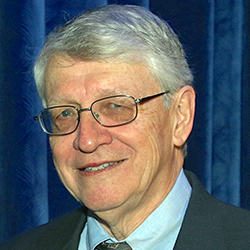Faculty DirectoryElmer Lewis

Professor Emeritus of Mechanical Engineering
Contact
2145 Sheridan RoadTech
Evanston, IL 60208-3109
847-491-3579Email Elmer Lewis
Website
Departments
Research Interests
Computational method of neutron transport, nuclear reactor physics, reliability and risk assessment.
Professor Lewis's research has included combining finite elements with other methods for the solution of the Boltzmann equation for neutron transport problems in six-dimensional space-angle-energy phase space. Applications are primarily to the simulation of neutron transport in nuclear reactor cores.
His current investigations are focused on neutron transport methods for treating the complex interactions between fuel-coolant lattice structures and more global effects in large power reactor cores. Under investigation are hybrid finite element and finite subelement formulations for treating spatial variables, tailored spherical harmonic expansions in angle, and preconditioned Krylov algorithms for the solution response matrix methods on parallel computers.
A second area of interest is reliability and risk assessment, focusing on how it relates to the engineering design process and particularly on the complex relationships between how technical experts and the public perceive the risks that accompany modern technology.
Selected Publications
Yunzhao Li, E. E. Lewis, Micheal A. Smith, Hongchun Wu and Liangzhi Cao, “Preconditioned Multi-Group GMRES Algorithms for the Variational Nodal Method,” Nucl. Sci. Engr (in press)
E. E. Lewis, Yunzhao Li, M. A. Smith, W. S. Yang and Allan B. Wollaber, “Preconditioned Krylov Solution of Response Matrix Equations,” Nucl. Sci. Engr. 173, 222-232 (2013)
E. E. Lewis and M. A. Smith, “Comparison of Homogenized and Enhanced Diffusion Solutions of Model PWR Problems,” Proc. PHYSOR 2012- Advances in Reactor Physics –Linking research, Industry, and Education, Knoxville, TN, April 15-20, 2012
Yunzhao Li, E. E. Lewis and M. A. Smith, “A Parallel in Energy Krylov Solution Algorithm for the Variational Nodal Method,” Proc. PHYSOR 2012- Advances in Reactor Physics –Linking research, Industry, and Education, Knoxville, TN, April 15-20, 2012
E. E. Lewis, M. A. Smith, W. S. Yang and A. Wollaber, “Preconditioned Krylov and Gauss-Seidel Solutions of Response Matrix Equations,” Proc. Int. Conf. on Mathematics, Computational Methods and Reactor Physics, Rio de Janeiro, May 8-12, 2011
E. E. Lewis, “Reactor Physics for Non-Nuclear Engineers,” Proc. Int. Conf. on Mathematics, Computational Methods and Reactor Physics, Rio de Janeiro, May 8-12, 2011.
E. E. Lewis, “Second Order Neutron Transport Methods,” Nuclear Computational Science: A Century in Review, Chapt. 2, Y. Azmy & E. Sartori, Eds. Springer, Dordrecht, 2010
E. E. Lewis, M. A. Smith and G. Palmiotti, “A New Paradigm for Local-Global Coupling in Whole-Core Neutron Transport,” Nucl. Sci. Engr. 161 279-288 (2009)
In the Classroom
Professor Lewis currently teaches courses in nuclear reactor physics and reliability engineering. He has also taught heat transfer and was an instructor for the freshman sequence, Engineering Design and Communication.
Textbooks
Four textbooks have resulted from his teaching and research:
E. E. Lewis, Nuclear Power Reactor Safety, John Wiley & Son, New York, 1977, 630 pp.
E. E. Lewis & W. F. Miller Jr., Computational Methods of Neutron Transport, John Wiley & Son New York, 1984, 401 pp. (Republished by Am. Nucl. Soc. 1993)
E. E. Lewis, Introduction to Reliability Engineering, John Wiley & Son New York, 1987, 400 pp. (second edition 1995)
E. E. Lewis, Fundamentals of Nuclear Reactor Physics, Academic Press/Elsevier. Burlington, MA. 2008, 293 pp.
He has written two books for the general public:
E. E. Lewis, Masterworks of Technology: The Story of Creative Engineering, Architecture and Design, Prometheus Books, Amherst, NY, 2004, 315 pp
E. E. Lewis, How Safe Is Safe Enough? Technological Risks, Realand Perceived, Carrel Books/Skyhorse. New York, 2014, 256 pp